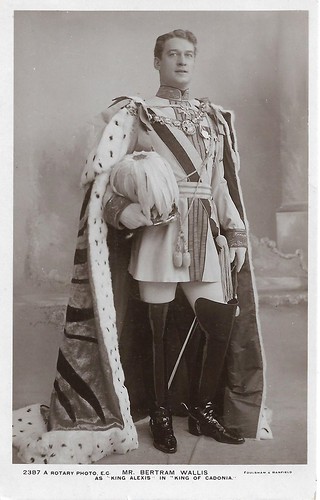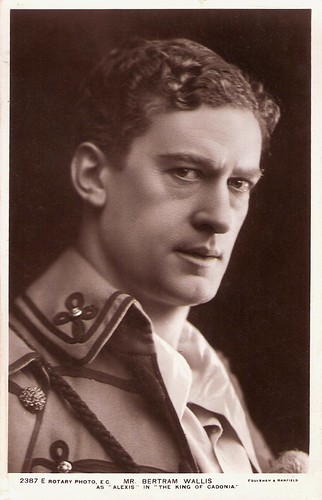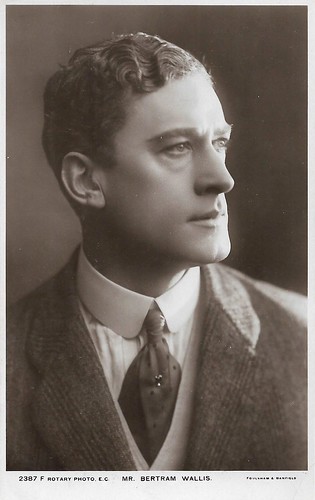
British postcard by Rotary Photo, E.C., no. 11642 E. Photo: Foulsham and Banfield. Bertram Wallis in 'The Count of Luxembourg', an operetta in two acts with English lyrics and libretto by Basil Hood and Adrian Ross, music by Franz Lehár, based on Lehár's three-act German operetta 'Der Graf von Luxemburg' which had premiered in Vienna in 1909. The original production opened at Daly's Theatre in London in 1911 and ran for 345 performances, starring Lily Elsie, Huntley Wright, W.H. Berry, and Bertram Wallis.

British postcard by Rotary Photo, E.C., no. 11642-0. Photo: Foulsham & Barnfield, Ltd., London.

British postcard by Rotary Photo, E.C., no. 2387 C. Photo: Foulsham & Banfield, Ltd., London. Collection: Manuel Palomino Arjona @ Flickr.

British postcard by Rotary Photo E.C., no. 2387 M. Photo: Foulsham & Banfield. Bertram Wallis as Conrad Petersen in 'Dear Little Denmark'.

British postcard by Rotary Photo E.C., no. 6928 D. Photo: Foulsham & Banfield. Bertram Wallis as Edouard Morny in 'The Joy Ride Lady'.
Rare talent
Bertram Wallis was a huge man who stood more than 2 metres tall. He was born in 1874 in London. His parents were Frederick Augustus Wallis and Sarah Mary (née Williams).
Bertram won the Westmorland Scholarship to study voice at the Royal Academy of Music. There he won the Parepa-Rosa gold medal and the Evill Prize.
His first professional engagements were in George Alexander's production of William Shakespeare’s 'As You Like It' (1896) and in Shakespeare’s 'Much Ado About Nothing' (1898).
In the early years of the 20th century, Wallis had his first successes on the musical stage, such as in 'A Country Girl'. He had the rare talent of being able to sing beautifully and also act superbly.
He then travelled to New York to play in several Broadway productions, including 'A Madcap Princess' (1904), 'Princess Beggar' (1907), and 'Miss Hook of Holland' (1907-1908).

British postcard by Rotary Photo, E.C., no. 2387 A. Photo: Foulsham & Banfield. Bertram Wallis as King Alexis in the play 'King of Cadonia' (1908).

British postcard by Rotary Photo, E.C., no. 2387 B. Photo: Foulsham & Banfield. Publicity still for the play 'The King of Cadonia' (1908). Collection: Manuel Palomino Arjona @ Flickr.

British postcard by Rotary Photo, E.C., no. 2387 E. Photo: Foulsham & Banfield. Bertram Wallis as King Alexis in the play 'King of Cadonia' (1908).

British postcard by Beagles Postcards, no. D 12. Photo: Claude Harris.

British postcard by Beagles Postcards, no. 268 K. Photo: Claude Harris.
Glamorous matinee idol
Bertram Wallis returned to London and established his career in the operetta 'King of Caledonia'(1908) at the Prince of Wales Theatre in the West End. From this point on, he reigned as one of the Edwardian age’s most glamorous matinee idols and one of its biggest male postcard-sellers.
He starred in a number of successful London musicals, often with Isabel Jay or José Collins, including 'Dear Little Denmark'(1909), 'The Balkan Princess' (1910), 'The Count of Luxembourg'(1911), and 'The Happy Day'(1916).
A hit was the revue 'Zig Zag!' (1917). Wallis' later musicals included 'A Southern Maid' (1920), 'Madame Pompadour' (1923), 'Blue Eyes' (1928), and 'So This is Love' (1929). In 1911, Wallis temporarily left the musical stage to appear in a non-musical melodrama, Beau Brocade at the Globe Theatre, for which he won good notices.
Between 1917 and 1945 Bertram Wallis also appeared in eight films. He first appeared in two silent films The Cost of a Kiss (Adrian Brunel, 1917) and Victory and Peace (Herbert Brenon, 1918).
After the introduction of sound film, he acted in The Wandering Jew (Maurice Elvey, 1933) starring Conrad Veidt. During the 1930s, he also played in the short film A Dream of Love (James A. FitzPatrick, 1938), Chips (Edward Godal, 1938), and A People Eternal (Maurice Elvey, Henry Lynn, 1939) again starring Conrad Veidt.
His final two films were The Shipbuilders (John Baxter, 1944) with Clive Brook, and Twilight Hour (Paul L. Stein, 1945). After the Second World War, Bertram Wallis retired. He died in 1952 at home in Kent. He was 78.

British postcard by Rotary Photo, E.C., no. 11642-D. Photo: Foulsham & Banfield, Ltd., London. Publicity still for the play 'Beau Brocade' (1911) with Bertram Wallis as Beau Brocade and Grace Lane as Lady Patience Gascoyne.

British postcard by Rotary Photo, E.C., no. 11642 J. Photo: Foulsham & Banfield. Bertram Wallis as Count René of Luxembourg in 'The Count of Luxembourg' (1911).

British postcard by Rotary Photo, E.C., no. 11642 Q. Photo: Foulsham & Banfield, London.

British postcard by Rotary Photo, E.C., no. 11784 C. Photo: Foulsham & Banfield, Ltd. Bertram Wallis and Lily Elsie in 'The Count of Luxembourg' (1911).

British postcard by Rotary Photo E.C., no. 2387 F. Photo: Foulsham & Banfield.
Sources: David Slattery-Christy (Anything But Merry!: The Life and Times of Lily Elsie), Wikipedia, Richard Traubner (Operetta: A Theatrical History) and IMDb.
No comments:
Post a Comment